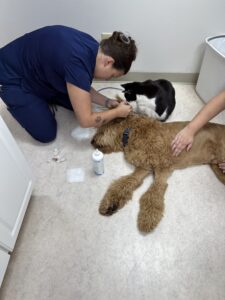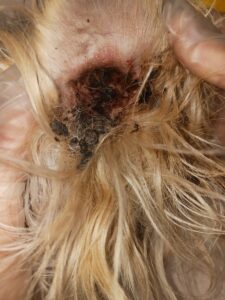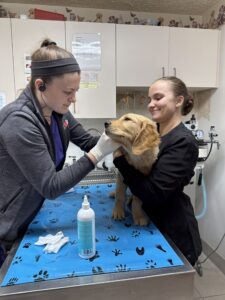Contact Us!
Ear Infection (Otitis)
Animal Doctor provides testing and treatment for chronic ear infection. We accept referrals and provide second opinions.
Description: Your pet may experience painful or itchy ear(s), and they may be inflamed. This may be a chronic, year round issue, or only during certain times of the year.
Symptoms & What to look for: The ear canal(s) may appear thickened, inflamed, or itchy, and you may see discharge or debris in them, as well as possible odor. Occasionally, the ear pinna (flap) may swell up and be fluid filled. This is an aural (ear) hematoma and is caused by repeated head shaking leading to trauma to the ear and bleeding inside the pinna.
How does it happen? There are many causes of ear infections (otitis) in pets. One common cause is getting water in the ear canals during bathing or swimming. The water is a great place for yeast and bacteria to grow. Certain breeds of dogs have excessive hair in the ear canals, which can also lead to infection. Another possible cause of ear infections is allergies. Seasonal allergies (allergic to trees, grasses, pollens, or weeds during certain seasons), and environmental allergies (mold, dander, dust mites, for example) are two common culprits. Another type of allergy that often causes ear infections is food allergies (pets can react to proteins, grains, vegetables, etc. in the foods and treats they eat).



Animal Doctor Ear Infection questions:
- How long have you noticed a problem with the ears? Is it both ears?
- How is the pet behaving? Scratching? Shaking? Pain?
- Has your pet had previous problems?
- Has your pet had recent bathing or swimming?
- Have you tried anything at home? When is the last time you cleaned your pet’s ears?
- Any history of allergies?
- What type of food are you feeding? How much per day? Any table scraps or treats?
- Is your pet on any medications?
What are the steps we take to treat your pet?
- The first step in diagnosing and treating your pet’s ear infection is taking a thorough history and completing a physical exam, including looking in the ears with an otoscope.
- We then take a sample of the debris inside the ear canals with a swab and stain a slide for cytology, to determine the type of infection in the ear(s), for instance bacteria or yeast (or a combination).
- Occasionally we may send the debris to an outside laboratory for culture, if the infection is particularly resistant and nonresponsive to therapy.
- We may also recommend blood allergy testing through VARL (Veterinary Allergy Reference Lab) to better determine the cause of chronic ear infections.
Animal Doctor Ear Infection potential treatment plans?
Oral medications
- Apoquel (Oclacitinib): this medication can stop the underlying cause of some ear infections, which can be allergy related (food, seasonal, environmental).
- Steroids (Prednisone): this medication can give immediate relief to the pain and itch your pet is feeling with an ear infection. There are side effects to this medication (increased drinking, urinating, and appetite).
- Antibiotics and Antifungals: Occasionally an ear infection can be so severe and painful that topical treatment cannot be initiated immediately. When there is a severe bacterial or yeast infection, we prescribe oral antibiotics or antifungals until topical treatment can be tolerated.
Injections
- Cytopoint is an innovative new therapy that targets allergies at its source. This injection can be effective in preventing ear infections caused by seasonal and environmental allergies, but less effective if food allergies are the cause of the otitis.
- Steroid injections can be helpful to immediately decrease any pain or swelling associated with a severe ear infection.
Dietary Changes
- If food allergies are thought to be a primary cause of the otitis, a diet trial with a prescription hypoallergenic food is recommended (Hill’s prescription z/d or d/d for example).
Topical Medications
- We often prescribe an ear cleaner to flush the ear canal(s) daily. These cleaners have a drying agent in them as well as helping to break up and flush out any debris in the ears.
- Topical antibacterial and yeast medications (solutions, ointments) are also a common treatment choice. With some of these treatments, the owner will treat the ears daily at home, and with other treatments, the doctor places the medication in the ear canals in the clinic, and it absorbs over several weeks to treat the infection.
- Topical steroids can be very helpful in cases of chronic inflammation and swelling or thickening of the ear canals.
What are the risks if ear infections are left untreated?
Ear infections left untreated are painful for your pet, and negatively impact your pet’s quality of life. There is also a significant risk of deafness if left untreated. And, if your pet develops an ear hematoma (swollen, blood filled ear flap) due to repeated head shaking, the ear must be surgically drained and can be expensive, painful, and scarring to the ear.
Animal Doctor Provider
Dr.










